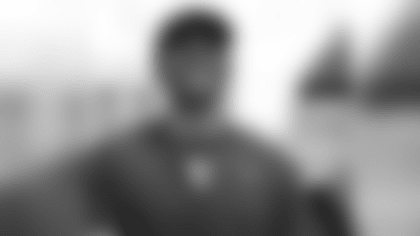Before Steven Radicevic, the Bengals' quiet but voluminously versatile director of pro scouting and free agency point man, headed into Monday's first day of the final set of draft meetings he relented to a conversation with Bengals.com senior writer Geoff Hobson.
In his 12th draft with the club, Radicevic is director of player personnel Duke Tobin's senior staffer and has been part of an AFC North title team that went unbeaten at home (2013) and another one that went unbeaten to get home (2022) with 10 straight wins.
Proud of his Los Angeles upbringing, UCLA lineage, and photo with late Dodgers manager Tommy Lasorda, Radicevic, a one-time aspiring veterinarian student, talks about this year's draft and teaming up with old UCLA teammate and Bengals senior personnel executive Trey Brown, as well as his unique journey into an NFL front office.
The Conversation:

GH: If it's April, that must mean you're doing a little of both. College and pros right now, right?
SR: Yeah, go to the West Coast schools and then Pottsie (director of college scouting Mike Potts) has me going to North Carolina schools, Wisconsin, Illinois, south Florida schools. Some of the Texas schools.
GH: How do you balance college and the pros?
SR: It's all I know. It's just constantly watching tape and evaluating players. It feels like an endless amount of guys you can watch, but it's good because it gives you a feel for what's in the draft and what's in free agency.
GH: Does scouting college players help you four years later in free agency?
SR: A hundred percent. Because you know these guys. Written them up. You've got reports on them. I've sat in all the draft meetings. It's definitely helped.
GH: Probably not many teams are structured in such a way where a pro guy is still so involved with the college scouting.
SR: I would say it's rare. It's very helpful. It's a good way to go about it.
GH: How do you view this year's draft, where the Bengals have the 18th pick in the first round?
SR: I think it's a strong draft. Probably one of the better ones just positionally across the board. It's a deep draft, except maybe for a couple of positions. But I think it's probably one of the better drafts that I've been around where if you're in the top 25, you're getting a player you would normally get in the top 10.
GH: You guys have been known to say the first round lasts for about 12 guys. This year, that's doubled?
SR: Exactly. That's how I personally view it. I feel like you're going get a guy you have a legitimate first-round grade on rather than in years past, where if you were between 18-25, you're going to get a guy you've got a second-round grade on.
GH: Does that depth last?
SR: I would say so. At least for sure the first and second rounds. I feel like you're going to feel pretty good about those first two picks. They're guys that have legitimate first- and legitimate second-round grades where you're not reaching for a player there.
GH: People forget about the extra third-round pick you just got. No. 97.
SR: It's awesome. You're going to get a starting-level player there.
GH: You worked this period of free agency with senior personnel executive Trey Brown. We're out of the major phase now, but was there any difference this year?
SR: They've all kind of been the same. We've got a budget and we're trying to figure out which of our guys we're going to be able to keep, and you get a better feel for that as you get closer to free agency. I think there are hopes you try to get a deal done before free agency starts. But by that time, I think a lot of players just want to wait to get to free agency.
If they know that we have an interest and we want to bring them back, they're going to wait to get to free agency and see what deals they can try and get and then maybe try to circle back with us. It's hard. You always have to get your Option A or Option if things don't fall the way you want them to fall. We've been fortunate to where I think we've done a good job as a group pivoting and moving in different directions as the negotiation period starts.
GH: What's the toughest thing about negotiating a free-agent deal?
SR: Probably not getting emotionally involved with some of the decisions. I think you have to step back and look at the bigger picture and see how guys are going to help win games for you next year, I'd say the second hardest part is probably just making sure you're getting a good feel for the level of interest that players you are working with are really getting. And trying to read agents.
GH: The one late-night deal seemed to be the one for Zack Moss.
SR: Trey did a good job. He worked that deal. I think we were all around.
GH: Did you have to excuse yourself from the dinner table?
SR: You always do. We're never home for dinner during free agency. Those first ten days, you're in the office. I don't see my wife until I get home at 11:30 and my phone is still going off with text messages. Then we get back at it here giving updates to Duke and ownership and the coaches at 7:30, 8 a.m.
GH: I know there was some frustration with the nose tackle spot, but you seemed to come out of free agency pretty much hitting all the immediate needs.
SR: Yeah. Obviously (Sheldon) Rankins is a different style of player than what we had with DJ (Reader), but he's going to help us with the interior rush and B.J. (Hill) is going to pair up really well inside. We haven't really had that combo since Larry (Ogunjobi) and B.J. were rolling together. The interior rush is something we were missing and we're hopeful that Rankins will give us that.
GH: Having a team led by Joe Burrow has to help draw in free agency.
SR: It definitely does with guys like (tight ends) Mike Gesicki and Tanner Hudson. Those types of guys know they're going to get their touches. I think Mike felt that a little bit last year in New England and knows what playing with a good quarterback can do for you. He definitely would have gotten a lot more going somewhere else, but he knew that coming here and playing on the one-year deal, he's going to benefit from the quarterback and the system that we have.
GH: The first wave of free agency is obviously over. What's next?
SR: We'll still meet. We met (Tuesday) with ownership just to give an update on players that are still available and what their market may be at this point. We'll still look to add maybe before the draft and then we'll see how it shakes out after the draft. All our adds were good. All character, locker-room guys.
GH: How can you gauge character in this process?
SR: It almost starts at fall school visits when you begin asking scouts about players on their teams and what their thoughts are on them. Relationships that you may have with other coaches. Personnel guys that you feel would give you an honest assessment of the guy. You start to reach out to those guys as the negotiations start to heat up a little bit. Just make sure you've got a comfort level for that guy.
GH: Since Tyler Boyd is still out there now, is he a guy you would talk about?
SR: Yeah. Tyler's obviously done so much for the team and for the city. If we can try to make it fit, maybe that's a route we go.
GH: What was it like getting Vonn Bell back? How did that happen? Were you surprised he was cut?
SR: Getting Vonn back was awesome. The structure of his contract was a surprise. But obviously, as soon as we were able to reach out to him, we did. He was a guy we wanted back with our young guys on the back end.
GH: Give me a Steven Radicevic scouting report on Steven Radicevic the player.
SR: Don't do that to me. You're going to make me do this? Really? You can't write about that. I wasn't very good. I was a good basketball player in high school. Football, I had a couple of offers coming out. Some of them were schools that weren't great academic fits. I wanted to be a veterinarian. So I went to (University of California at Davis). That was the first year they were offering full scholarships for football. I was a light tackle. About 245. I played O-line. Wanted to play D-line. Got up to 295. The D-Line coach at UCLA had recruited me coming out as a walk-on and I wanted to play a higher level, so they took me in.
Within a couple of weeks, I got in a car accident on Mother's Day, ruptured my back, and it was hard for me to keep the weight on after that … When I stopped playing head coach Karl Dorrell asked me if I wanted to coach as a student assistant on the D-Line and I was in the office seven days a week. I love the game and wanted to be around it.
Coach Dorrell got let go at the end of my senior year and Rick Neuheisel came in and I knew I wanted to stay involved. I just kind of hung around the football offices every day. Obviously, he was busy trying to get the staff set and I was just hanging around helping out with recruiting, trying to get the videotapes logged, and then he came in and said, 'Hey, kid, what do you do here?' He brings me in as assistant director of football operations.
And then within maybe two or three months, (offensive coordinator) Norm Chow was in his ear and told him, 'You need to bump Steve up. He's doing most of the operations work.' Within a couple of months, Rick changes my title to director of football operations at the age of 23.
GH: What did you like about operations?
SR: The part of operations that I really wanted to take over was being the pro liaison and forming relationships with NFL scouts because I knew that was probably more of the route that I would want to pursue. When I started doing that, I built relationships with Duke and obviously every other scout that came in throughout those years. Now a lot of those guys are GMs, assistant GMs, director of player personnel, guys that have worked their way up in their careers. It gave me a good, base, good foundation. When Neuheisel got let go, Duke shot me a text and asked me if I'd be willing to come in for an interview.
GH: How did you and Duke click?
SR: The first time Duke reached out he wanted to come in on like a Sunday. It was an off day. I got him set up with tape. Most of the schools are closed on Sundays. But I was there seven days a week so I tried to take care of the scouts as much as I could. I remember him asking me on the sidelines of a practice what I wanted to do and I wanted to work in personnel and help build an NFL roster. I really enjoyed that part of it on the college side.
GH: That's the field where we practiced the week of the Super Bowl, right?
SR: Yeah, I grew up 15 minutes from UCLA's campus.
GH: Part of the allure had to be you knew you could make an impact right away for Duke who likes a staff that can do it all.
SR: That was a huge part of it. There were a couple of other teams that were going to bring me out for interviews that year and I felt like this would be a place where you could jump in right away and learn how to negotiate contracts, bring players in for workouts, be around the office every day, handling the ready lists. I mean, there's just so many different roles that we all have.
GH: A lot of your UCLA teammates and coaches have gone on to the NFL. The Bruins Mafia. You like to pull out that 2009 team picture.
SR: Dave Raih, the tight ends coach for Washington. This is just one year. Cali is not on this one. (Titans head coach Brian Callahan) is on my other one at the house. Phil Rauscher, the O-line coach for the Jaguars. This one isn't the good one that has all of them. Clark Lea, the head coach at Vandy. Chris Horton, the special teams coach for the Ravens. Justin Hickman, scout for the Patriots. Tony White, the defensive coordinator at Nebraska, was on that staff.
GH: And you and Trey were teammates and now you're doing NFL free-agent deals together.
SR: It's crazy.
GH: What do you like about Trey?
SR: He works his tail off. Sharp. Brings great ideas. Brings the energy. He builds relationships. I think a lot of free agency is having relationships with agents and having the agents feel comfortable enough with you to try and get a deal done.
GH: A really smart cornerback. A Jim Thorpe candidate.
SR: Very smart. That's how he got all those PBUs.
GH: Wasn't exactly a burner, right?
SR: Say great short area quickness.
GH: Does your one-time desire to be a veterinarian help you in negotiations?
SR: No. I realized after a year of school I was not going to be a vet. It's years and years of school.
GH: Do you have pets now.?
SR: Just one dog. Montana.
GH: How did he get the name?
SR: We found him in Compton. He had a big scar on his back. For Tony Montana in Scarface.
GH: He's older than the kids, right?
SR: Liam is eight and Ariana is six.
GH: After free agency, where do you take your wife Sheena on a date night?
SR: Mita's. Jose Salazar is one of the best chefs. He's got three spots. Awesome guy.
GH: You've got an amazing family story.
SR: I'm Serbian, Croatian, and Hispanic … My mom was born in the U.S. Her father was born in what was then Yugoslavia and after the war (World War II), all his family got separated. He was put in a concentration camp with his brothers. They moved to Milwaukee and we've got a Serbian restaurant there called "Three Brothers." It's been on the Food Network. It's won a bunch of awards for Serbian cuisine. A really cool story. They all met up in Milwaukee and built a pretty famous restaurant.
Mike's (Brown) friend has gone to my family's restaurant. He loves it. So Mike is always talking to me about it. I guess his friend is always sending him articles about the restaurant.















